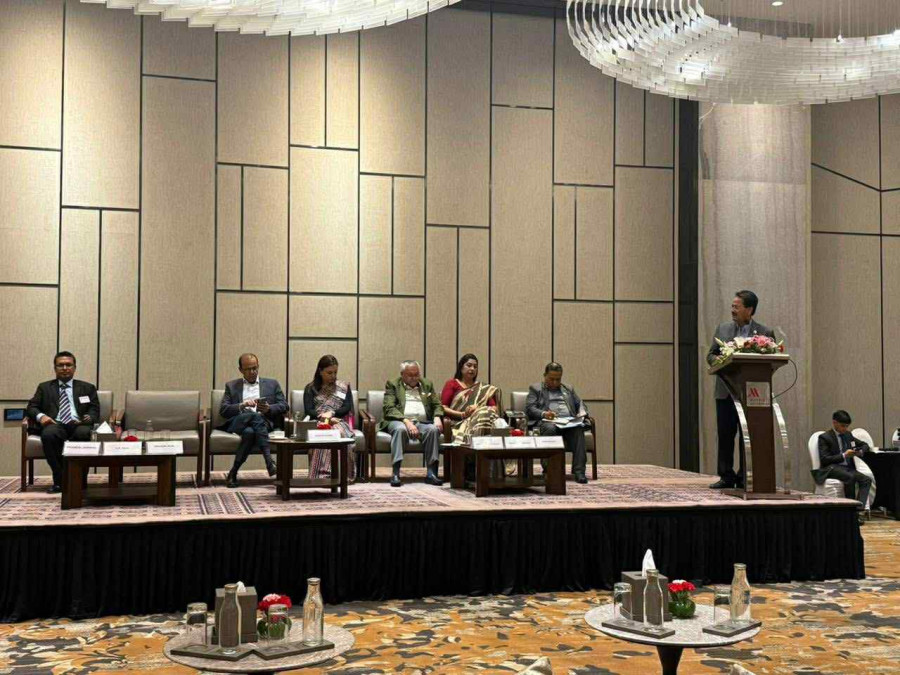National
Experts call for robust counter-terrorism policy in regional context
Nepal is also vulnerable to terrorist attacks that have afflicted India, they say.
Post Report
Experts, diplomats and security officials have called for a robust counter-terrorism policy to control terrorism in the region.
Particularly in the wake of the Pahalgam terrorist attack in India on April 22, they also called for setting up security coordination with India, border management, intelligence-sharing and checking cross-border movements so that Nepal can prevent any incident in the future.
The interaction was organised by the Nepal Institute for International Cooperation and Engagement (NIICE) on the theme of “Terrorism in South Asia: Challenges to Regional Peace and Security”.
Minendra Rijal, a former defence minister, stressed that a terrorist attack on India will have spillover effects on Nepal.
He noted that Pakistan's promotion of terrorism has not only made SAARC inactive but also hindered regional economic integration and caused significant economic losses for Pakistan.
He called for global unity—similar to the solidarity seen after the September 11 attacks in the United States—to combat terrorism effectively.
Rastriya Swatantra Party lawmaker Shisir Khanal said that the imperative for enhanced bilateral cooperation with India is undeniable in the wake of the Pahalgam terrorist attack.
“We must move beyond existing mechanisms and deepen our collaboration. This means we have to strengthen border management and surveillance; invest in modern surveillance technology; increase well-equipped checkpoints; and ensure they [terrorists] cannot be easily circumvented,” said Khanal.
“Likewise, there should be initiatives for deepening intelligence sharing and joint operations; establishing a unified, real-time intelligence hub; ensuring consistent and regular meetings between our border security forces, and conducting more frequent and complex joint counter-terrorism operations.”
Speaking at the event, Sunil Bahadur Thapa, adviser to the President of Nepal and former industry minister, said that groups like Lashkar-e-Taiba (LeT) and Jaish-e-Mohammed (JeM), which are UN-designated terrorist organisations, have historical ties to Al-Qaida and operate in Pakistan, posing risks to India and potentially using Nepal as a transit point.
Chanda Chaudhary, a member of Parliament and former minister for women, children, and senior citizens, highlighted the importance of curbing money laundering as a means to preventing cross-border terrorism.
After the Pahalgam attack, Prime Minister KP Sharma Oli and Foreign Minister Arzu Rana Deuba immediately condemned the "barbaric terrorist attack" in strong terms, extending their condolences to the victims and their families. The Ministry of Foreign Affairs also affirmed Nepal’s stance, saying that “we stand firmly with all nations in the fight against terrorism”. The ministry added that “Nepal shall never allow its soil to be used by any dangerous force against any neighbouring country”.
Dinesh Bhattarai, a former diplomat and adviser to the prime minister, shared that the Pahalgam attack was the deadliest in recent years, because the victims were brutally killed after being asked to disclose their religion and shot in their head. A Nepali national was among the victims.
NP Saud, a former minister of foreign affairs, said that Nepal and regional powers should develop a clear mechanism to control terrorism, warning that terrorism affects everyone indiscriminately.
Purna Silwal, retired major general of Nepal Army, emphasised that countries must not have double standards in counter-terrorism efforts if terrorism is to be eradicated.
Madhu Raman Acharya, a former foreign secretary, stressed the need for intelligence-sharing and joint border patrols between India and Nepal. In the fight against terrorism, “we are with India”, he added.
Sumitra Karki, the director of NIICE, referred to the 1999 hijacking of Indian Airlines Flight IC-814 from Kathmandu by Harkat-ul-Mujahideen and the recent terror attack in Pahalgam by Pakistan-based Lashkar-e-Taiba that killed 26 civilians to highlight Nepal’s vulnerability to terrorism.
The seminar brought together political leaders, former ministers, security experts, academicians, and scholars, and was attended by over 150 participants, including members of Parliament.




 13.12°C Kathmandu
13.12°C Kathmandu













